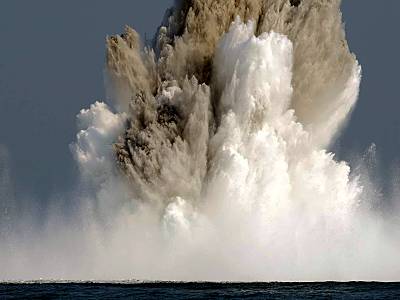WASHINGTON, Sept. 15, 2011 — The message to insurgents was made clear by a senior official from the International Security Assistance Force Joint Command as he spoke to Pentagon reporters today.
“We’re not going to abandon Afghanistan,” said British army Maj. Gen. Tim Evans, chief of staff for the International Joint Command headquarters. “And even past 2014 there’s talk of the strategic partnership [where] we will be giving support to the people of Afghanistan.”
“We are going to be here to [2014] and beyond,” he added. “We are determined to work toward our goal of ridding Afghanistan of these terrorist sanctuaries.”
Recent insurgent attacks in Afghanistan include the Sept. 13 assaults on the U.S. Embassy and other targets in Kabul, and the truck bomb that exploded Sept. 10 near a combat outpost in Wardak province, wounding 77 U.S. soldiers and killing five Afghans, including a child.
Such attacks have been ineffective, Evans said, noting the insurgents have resorted to such high-profile assaults to “exaggerate their influence.”
The insurgents “are trying to get media attention with such attacks and undermine the confidence of Afghan security forces and the international community,” he said. “These sorts of attacks have the opposite effect, and just stiffen our resolve.”
In Kabul, Afghan security forces “dealt with the situation with minimal ISAF assistance demonstrating, once again, that they do have the capability to do so,” Evans added.
Evans attributed the “spectacular” attack in Kabul and other recent attacks to the 10th anniversary of 9/11.
“We do believe they were trying to do an attack on the anniversary of 9/11,” he said. “Both our Special Forces and Afghan Special Forces actually thwarted a number of attacks.”
ISAF has ramped up efforts to dismantle and defeat terrorist networks throughout the country, the general said.
“Over the past year, we have consciously decided to take the fight to the insurgents,” he said. “We have relentlessly pursued them, seized the initiative and focused our efforts on targeting the insurgents’ command and control, their support bases and infiltration routes.”
“Our special forces, in partnership and often led by Afghan special forces, have had a dramatic effect on capturing or killing hundreds of the mid-level insurgent leadership,” Evans added.
“We’re aware of the challenges that still face Afghanistan, but we are seeing signs of progress,” he said. “The peoples’ trust in their security forces and the government of Afghanistan does continue to grow.”
Evans cited security gains as “instrumental in generating opportunities for progress.”
“We’ve seen this quite clearly in central Helmand and Kandahar [provinces],” Evans said. “We are on the offensive, exploiting our gains and trying to strengthen the local governance and protecting their population. And we’re going to build upon this momentum.”
He also acknowledged it isn’t solely a tactical endeavor to stabilize the country and facilitate transition.
“We’re seeing some key improvements in governance and development,” Evans said. “Afghans are now voting in local elections. For example, a year ago Marja was a Taliban stronghold.”
Evans cited the elections as an example of coalition success, with citizens electing new leadership last spring.
“There are also now currently more than 26,000 elected community councils across Afghanistan, which support local community-driven development projects, including road building, electricity generation and irrigation,” he said. “The merit-based hiring system, civil-service job fairs and representative shuras have also strengthened and increased the capacity of local governance and weakened corruption across the country.”
Evans also cited a 300,000-strong force of Afghan security forces helping complete the first phase of transition.
“This represents a significant increase over the 90,000 that were gained in 2010,” he said. “So there has been positive progress, particularly on the part of our Afghan partners. We have built up a momentum that we will maintain in the future.”
“We acknowledge that this is not going to be easy … we do not underestimate our task,” Evans continued. “But we do have the right strategy, the initiative, the momentum, and the Afghans are certainly up for it.”
Evans commended ISAF forces for training and mentoring Afghan security forces that will provide security for about 7 million people � a quarter of the Afghan population — with the completion of the first phase.
“The soldiers, sailors, Marines, airmen and airwomen are doing a sterling job out here in Afghanistan,” he said. “But we [have to] make sure we remain steadfast and have the resolve to make sure we see this mission through, and support the Afghan people.”
Source:
U.S. Department of Defense
Office of the Assistant Secretary of Defense (Public Affairs)

 von
von 